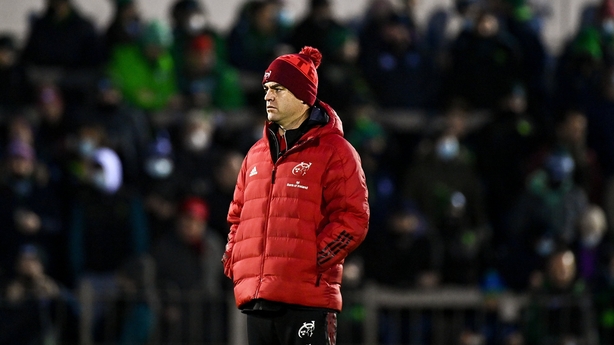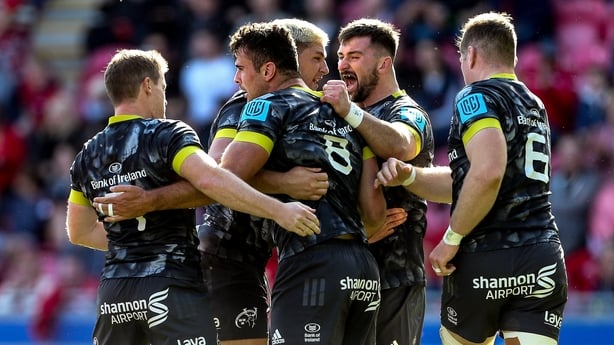To watch Connacht play rugby so far this season has been an experience.
We've seen them excel at the Aviva Stadium against Ulster on a mild evening and a flat track, and we've seen them defy the Galway Bay wind and rain in a thumping of the Ospreys.
We've also seen them on the bad days, like their feeble defeat to the Dragons in October when they fell off tackle after tackle, or that night in early December when they were taught a lesson by Leinster at the RDS.
Their 'Fast, Relentless, Adaptable' mantra remains a work-in-progress, and while their squad depth is improving year on year, their limited resources mean there will be bad days here and there.
But in spite of the bad days, they have a clear, obvious identity to their game. Regardless of the weather or the venue or the opposition or the teamsheet, Connacht fans can go to the Sportsground or turn on their TV knowing how their team will approach the opposition.
"Our whole focus is how we're going, what we need to do," said Andy Friend ahead of their Heineken Champions Cup trip to the ultra-conservative Leicester Tigers last month.
"What are the threats they pose? How do we resist those? How do we impose our game style or our identity on Leicester?" Friend asked.
While Connacht were ultimately beaten, they stuck to their identity, and it was one which caused Leicester huge problems. When the Tigers come to Galway next week, expect Friend's side to play in broadly similar strokes.
Their commitment to their style and their philosophy and their identity has been in stark contrast to Munster this season, summed up in last Saturday's derby game at the Sportsground, which Connacht edged out 10-8.
While it was more conservative than we normally see Connacht play, it was still backboned by a willingness to move the ball, to keep the ball-in-play time up, and to get the opposition moving around the pitch.
This week, full-back Mike Haley was asked about how much more there is to come from the Munster attacking game this season, and while he was just the messenger, his answer didn't inspire confidence in their approach for the rest of the season under Johann van Graan (below) and Stephen Larkham.

"I think it all kind of depends on the game that we are playing, the way the weather is sometimes," Haley said.
"Because if you look at some of the games we had prior in the year against the Stormers and the Sharks, we had some unbelievable rugby — Scarlets especially away — we played some fantastic rugby.
"I think we just don't put ourselves under pressure to perform a certain way every single time. We like to think ourselves quite fluid, we are quite adaptable."
To take Haley's comments at face value, Munster don't have a defined style of play, and their performances this season would support it.
Too often, the game-plan seems dictated by the opposition's strengths rather than their own. At times, they're simply giving the opposition too much respect, which hints at a lack of belief in their own ability to impose themselves.
The most common description of their game-plan is that they are modelling themselves on the Springboks' conservative style of possession and territory and physicality, and while those traits have been the foundations of a number of their performances this season, they've also played to the other extreme.
As referenced by Haley, in some of their early season wins against the Scarlets and Sharks, and to a lesser extent the Stormers, they played a hugely exciting brand of rugby, searching for the edge of the defensive line early and stretching the opposition.
The knock-on effect of having a style of play so heavily influenced by outside factors is that there is no real identity to the team.
Too often, the game plan seems dictated by the opposition's strengths rather than their own. At times, they're simply giving the opposition too much respect, which hints at a lack of belief in their own ability to impose themselves.
Against a second-string Castres side at Thomond Park, they played like a team desperate for a win rather than one confident of doing so.
While Ben Healy's willingness to shoot for the posts at every opportunity is admirable, it played into the hands of a French side who looked delighted to slow the game down.
They can be given some slack for the circumstances they found themselves in in December, decimated by the complications of their tour to South Africa, but with the majority of teams across Europe's top leagues now dealing with Covid outbreaks of their own in recent weeks, that excuse can't hold water for much longer.
Indeed, the inconsistency of their approach has ironically been a consistent theme in the last couple of seasons.
Against Leinster in last season's Pro14 final they never fired a shot, before going down gunslinging against Toulouse in the Champions Cup a week later. Two defeats in the space of seven days, but two polar opposite approaches to the game.
This season they looked adventurous and exciting in their opening URC games, even when rotating their squad against the Scarlets, but reverted to slow, methodical rugby for their October games against Connacht and the Ospreys, long before they were impacted by their trip to South Africa.

Regardless of their approach, Van Graan has built up a creditable win record of around seven in 10, and it's unlikely to vary too dramatically over his final six months at the province.
But with he and Larkham both leaving in the summer, the tolerance for a conservative style of rugby drops dramatically, and has now led to some loud calls - notably from Keith Wood - for Munster's professional games board to take the hit and release Van Graan now. Some have suggested cutting ties with Larkham too.
It seems unlikely right now, but the next three weeks will be crucial.
On Saturday night Ulster come to town, and it remains to be seen what sort of a cavalry they will bring, with the province waiting on their Covid-19 outbreak to clear up.
Whether their squad is stacked or depleted, Ulster's preparation for the game has been severely impacted in recent weeks, with consecutive games postponed and their training ground closed for a period.
From a Munster perspective, another game plan designed to counter the opposition rather than dictate to them would be an alarming approach to take.
A win against Ulster is vital, but if it's achieved with win-at-all-costs rugby, it's unlikely to lift much of the pressure.
Listen to the RTÉ Rugby podcast on Apple Podcasts, Soundcloud, Spotify or wherever you get your podcasts.
Follow Munster v Ulster (Saturday 7.35pm) via our liveblog on RTÉ.ie/sport and the RTÉ News app, watch live on RTÉ2 and the RTÉ Player or listen to commentary on RTÉ Radio 1 Extra.


